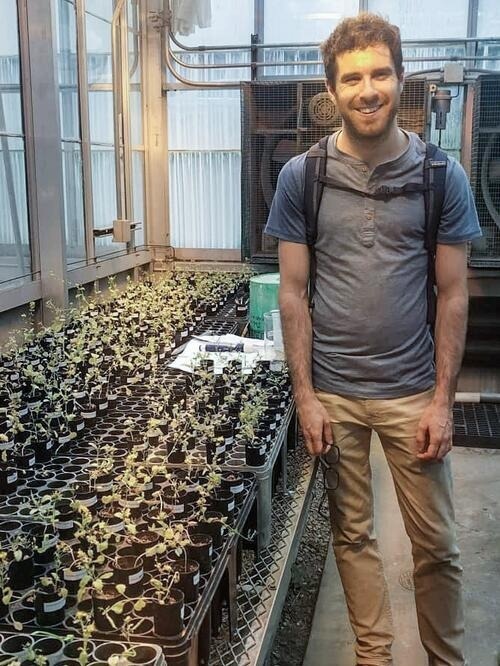Under the ground is a complex biological system brimming with diverse and interrelated life. In times of stress, plants send chemical signals to summon bacteria that can bind with nutrients and identify water in soil pores too tiny for the finest roots. In exchange, microbes get a safe home to live in or a sweet drink.
 Kevin Ricks. Image Credit: University of Illinois Urbana-Champaign
Kevin Ricks. Image Credit: University of Illinois Urbana-Champaign
It is a typical case of “you scratch my back and I will scratch yours.” Aside from when it is not. According to a recent study from the University of Illinois at Urbana-Champaign, free-living soil bacteria only care about themselves.
Researchers from the College of Agricultural, Consumer and Environmental Sciences (ACES) discovered in a multigenerational experiment that bacteria did not respond to plants’ calls for assistance but instead assisted plants in surviving drought.
On the contrary, the environment itself favors bacteria that can survive drought. Those resilient bacteria also occurred to increase the drought tolerance of plants while they were doing their job.
It was a surprise because I expected to see evidence of coevolution and mutualism between the microbes and plants. I think people, myself included, forget that just because microbes do something adaptive or beneficial to the plant, it doesn’t necessarily mean they’re doing it for the plant.
Kevin Ricks, Postdoctoral Researcher, University of Toronto
In pots with or without plants, Ricks created soil communities to study how bacteria assist plants in coping with drought. For three generations, he alternated between providing plenty of water for half the pots and creating a drought in the other half.
The objective was to give time for selection to take place, perhaps allowing plants to indicate their need for assistance and select microbes that provided it.
Ricks tossed everything together for the experiment’s second phase. The same watering practices were used when he planted plants in the same soil from phase one, but some plants were now suffering from drought in soils that had received plenty of water for generations, and vice versa.
He predicted that soil bacteria from historically dry pots would have evolved to such circumstances, assisting plants in surviving drought better than microbes from historically moist pots. And this is what he discovered: Plants cultivated with drought-adapted bacteria grew larger.
However, and this is critical, this was true in phase one for soils planted with or without plants. In other words, microorganisms adapted to drought throughout time without being selected for by plants via chemical signals.
Even when cultivated with plants years later, they continued to deliver advantages. It was confirmation that these bacteria were doing their own thing and only benefited plants by chance.
Since no prior study on the topic included a no-plant control, researchers concluded that microbes and plants were interacting in a co-evolutionary conversation.
Our results challenge classical thinking about what counts as a mutual benefit. Mycorrhizae and nitrogen-fixing bacteria are kind of model systems, things that people study when they talk about mutualism. But then there is this fuzzier set of interactions that we don’t understand yet, but could still wind up having a mutual benefit, or at least a one-way benefit to the plant. I think our approach brings this system into the spotlight.
Tony Yannarell, Associate Professor, Department of Natural Resources and Environmental Sciences, University of Illinois Urbana-Champaign
Before implementing treatments in phase two, the researchers sterilized specific phase one soil. Plants in historically dry soils fared no better in such containers during droughts.
Yannarell added, “Some previous studies did not actually compare soil with and without microbes, so it is hard to really implicate the microbes as the driver of the benefit. There are a lot of things that could have been different in the soil, but when we sterilized the microbes away in our experiment, we lost the benefit of the drought adaptation.”
The microbes used in the experiment were not identified by the researchers, thus it is unclear exactly how they helped the plants. However, according to Ricks, soil microbes are engaged in a variety of activities that can help plants endure stress.
Ricks further noted, “Microbes are responsible for nutrient and carbon cycling, so whether or not they are actually facilitating plant access to water, they could still be freeing up nutrients that make the plant healthier and more resilient to stress.”
Ricks was hesitant to declare that his work would transform paradigms in ecology research, given that it was a greenhouse experiment focusing on free-living soil bacteria and a specific sort of environmental stress.
However, he believes that it will inspire other scientists to include no-microbe and no-plant controls in future investigations.
Source:
Journal reference:
Ricks, K. D., et al. (2023). Soil moisture incidentally selects for microbes that facilitate locally adaptive plant response. Proceedings of the Royal Society B. doi.org/10.1098/rspb.2023.0469